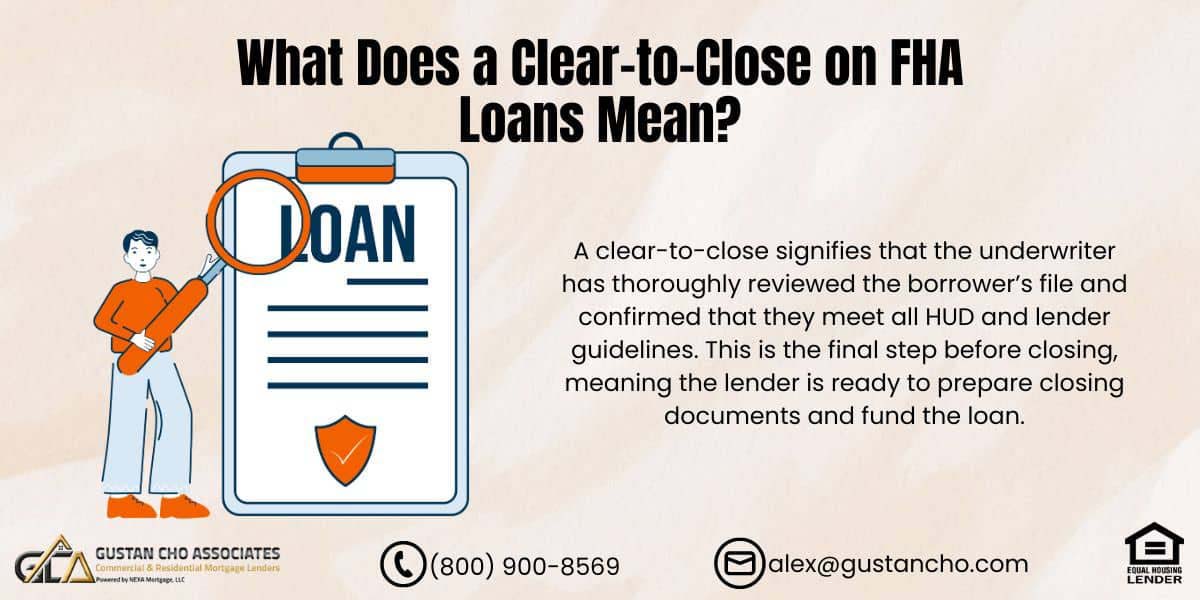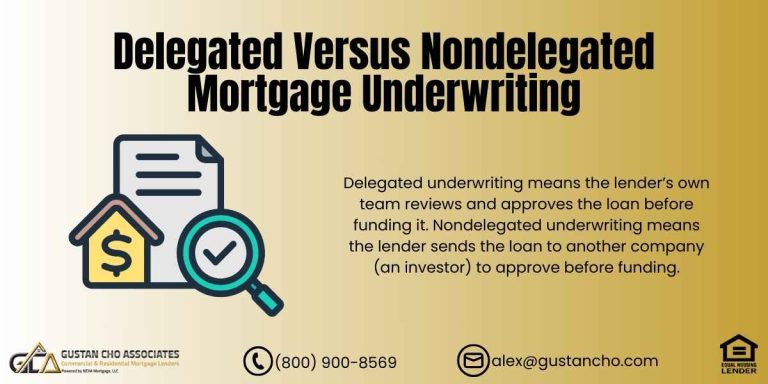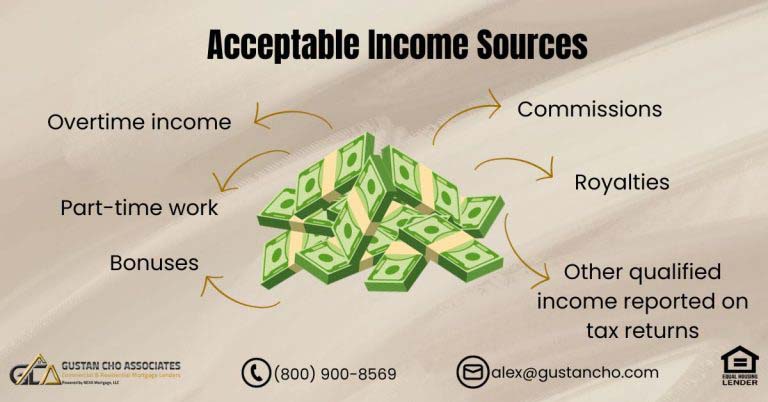This guide covers what a clear-to-close on FHA loans means. What does a clear-to-close on FHA loans mean for borrowers? A clear-to-close is the final step of the mortgage process before the home closes. The mortgage underwriter is the person who signs off on the clear-to-close. The clear-to-close is commonly referred to as the CTC. The underwriter will only issue the CTC to a borrower after she has thoroughly reviewed the borrower’s file. This includes the mortgage loan application, credit report, credit scores, income, all pertinent documents, and the automated findings of the automated underwriting system.
Third-Party National Public Records Search During Mortgage Process
The underwriter has conducted a thorough background check on the borrower using national public records from a third-party service like Data Verify or Lexis Nexis to see if there are any public records that did not show up on the credit report. They have also carefully reviewed the home appraisal. Once the underwriter confirms that the borrower meets all the lending guidelines and can afford the new mortgage payment, they will issue a clear-to-close. In this article, we will explain what a clear-to-close means.
What Does a Clear-to-Close Mean
Clear-to-close on FHA loans means the borrower met all HUD guidelines for an FHA loan. The borrower has met all conditions of the mortgage underwriter’s conditional mortgage approval. Verification of funds has been met, and the buyer has qualified, seasoned funds to close on their FHA loan. The underwriter has signed off on the borrowers and has authorized the lender to prepare documents. The FHA Loan is ready to fund once the title company has the final closing disclosure. In this article, we will cover and discuss clear-to-close.
Ready for Your Clear-to-Close on Your FHA Loan? Let Us Help You Get There!
Contact us today to ensure all conditions are cleared and you’re ready to close on your FHA loan.
What is the Difference Between Initial and Final Closing Disclosure?
The initial and final closing disclosures are important documents in the home-buying process, particularly for mortgage buyers. They provide key details about the loan terms and costs associated with the purchase. Here’s how they differ:
- Initial Closing Disclosure (ICD):
- Purpose: Gives an overview of the terms and costs associated with the loan, helping the buyer understand what to expect.
- Timing: The lender must provide it at least three business days before closing, as mandated by the Consumer Financial Protection Bureau (CFPB).
- Content: It includes the loan amount, interest rate, monthly payments, closing costs, and other financial details.
- Revisions: If the terms significantly change (e.g., interest rate changes or changes in loan product), a new initial closing disclosure must be issued, which may reset the three-day review period.
- Final Closing Disclosure (FCD):
- Purpose: Provides the final, accurate details of the loan terms and costs, reflecting the most current and final figures.
- Timing: This is given to the buyer at closing or just before closing. It confirms that the numbers are correct and consistent with what was initially disclosed.
- Content: Similar to the initial disclosure, but with exact, finalized numbers, including actual closing costs and adjustments.
The initial closing disclosure is a preliminary version outlining the expected loan details and costs. In contrast, the final closing disclosure includes the finalized numbers needed for signing at closing.
Steps Leading To Clear-to-Close on FHA Loans
The clear-to-close on FHA loans is the finish line that all borrowers, loan officers, realtors, and everyone in the mortgage process want to get to. Clear-to-close on FHA loans means the borrower is fully approved, and the lender is ready to prepare closing documents and wire funds. There are multiple stages in the mortgage approval process. The first stage is getting the mortgage loan applicant pre-approved.
The mortgage loan borrower needs to complete a mortgage loan application. Completes a 4-page 1003 mortgage application. The loan originator will go over the 1003 mortgage application.
The loan officer will ensure all the information the mortgage applicant completes is correct and complete. The loan officer then runs a tri-merger credit report. Once the mortgage loan originator gets the results of the tri-merger credit report, he or she contacts the mortgage applicant to review the credit report and credit scores and ensure there are no errors. The mortgage loan originator then submits the file to the automated underwriting system for approval.
What is the Fastest You Can Close on a House?
The speed of closing on a house depends on various factors, such as your financing method, the local market conditions, and the efficiency of your team (lender, real estate agent, attorney). Here are a few key points to consider:
- Cash Purchase: If you’re buying with cash, closing can be much faster since you don’t have to wait for a mortgage approval. It could take as little as a week to complete, depending on how quickly you can do the paperwork and inspections.
- Mortgage Loan: If you’re using a mortgage, the timeline will be longer due to the lender’s approval process, appraisal, and underwriting. With efficient processing, closing can take around 30 days, but it’s often longer if there are complications.
Pre-Approval: Pre-approving a loan in advance can expedite closing, as the lender has already assessed most of your financial details.
- Inspections and Appraisals: Scheduling inspections and appraisals quickly helps avoid delays.
- Title Work: Ensuring no title issues in advance can prevent hold-ups.
- Seller’s Timeline: The seller may need time to vacate or address certain contingencies.
So, in ideal conditions, a closing can take between 1 and 4 weeks, but most sales take around 30-45 days.
Clear-to-Close on Your FHA Loan? Let’s Finalize Everything for a Smooth Closing!
Contact us now to ensure all requirements are met for a hassle-free closing.
Automated Underwriting System
A loan officer needs an automated approval based on DU FINDINGS or LP FINDINGS to move forward with a borrower’s mortgage application. The loan officer requests the necessary documents to process the mortgage loan. They review these documents and may ask a mortgage underwriter to take a look if there are any unclear situations. Once the loan officer is confident that the loan will be approved, they will issue a pre-approval letter. With this strong pre-approval letter, the homebuyer can start looking for a home.
Shopping For a Home After Pre-Approval
All pre-approvals from mortgage lenders are not equal. Loan officers should not sign off on pre-approval for home buyers unless they have thoroughly pre-underwritten the file. Loan officers are not mortgage underwriters but will know what files will get approved and which will not. All pre-approvals should be reviewed, processed, and get approve/eligible per the automated underwriting system.
Over 80% of our borrowers are folks who either got a last-minute loan denial or are stressing over the mortgage process because they were not properly qualified.
All of our pre-approvals are full-credit mortgage loan approvals that have been fully vetted. Gustan Cho Associates is a national mortgage company licensed in multiple states with no overlays on government or conventional loans. With a solid pre-approval fully underwritten and signed off by our experienced loan officers, homebuyers can rest assured that their home loan will not just close on time.
Mortgage Process Leading To Clear-to-Close on FHA Loans
Gustan Cho Associates is one of the few national mortgage companies that offers TBD Property Underwriting Approvals. When borrowers get approved based on DU or LP findings and receive a solid TBD Property Underwriting Pre-Approval signed by a mortgage underwriter, they can start shopping for a home.
Once buyers find a home they want to purchase, they can sign a real estate purchase contract and submit it to the mortgage lender. The mortgage loan originator will then send the loan estimate and disclosures for signature.
Buyers will need to provide updated mortgage documents, such as paycheck stubs, 60-day bank statements, and other necessary paperwork for processing and underwriting. A mortgage loan processor will handle the loan applications and documents, which will go back to the underwriters who issued the initial conditional mortgage approval.
What Does Conditional Approval Mean?
If everything goes well, the underwriter will approve a conditional mortgage loan for the borrower. All of our pre-approvals at Gustan Cho Associates are fully vetted and qualified. Gustan Cho Associates has no lender overlays. We go off the automated underwriting system findings of the AUS. Gustan Cho Associates also offers TBD Underwrite Pre-Approvals.
All TBD Underwrite pre-approvals are conditional mortgage loan approvals. All pre-approvals are fully underwritten and signed off by mortgage underwriters.
Once the mortgage underwriter issues a pre-approval letter, the borrower can shop for a home. All of our pre-approvals at Gustan Cho Associates are close. This is because Gustan Cho Associates has no lender overlays on government and conventional loans. This is because they are fully vetted and qualified before a loan officer will issue a pre-approval letter.
Clear-to-Close on Your FHA Loan? Let’s Close on Your New Home!
Reach out today to make sure everything is ready for your FHA loan closing.
Clear-to-Close on FHA Loans: Conditional Loan Approval
A conditional mortgage loan approval is a letter of intent where the lender can grant the borrower a formal mortgage loan approval and clear-to-close once all conditions have been submitted. Conditions include the following:
- Home Appraisal
- Appraisal review
- Verification of employment
- Updated paycheck stubs
- Updated bank statements
- Letter of explanation for larger or irregular deposits
- Documents missing
- Income tax verification with the IRS
Other items or proof on those items listed on the mortgage application such as the following:
- Bankruptcy papers
- Foreclosure papers
- HUD settlement statement if the borrower had a prior short sale
- Insurance company information
- Other information
Clear-to-Close on FHA Loans Means Lender Is Ready To Fund
A clear-to-close is when a mortgage lender is ready to fund and send mortgage documents to the title company. A clear-to-close is the ultimate mission and goal of the mortgage approval process. Getting a clear-to-close from the mortgage lender means that all mortgage conditions have been met. The mortgage lender has given everyone a thumbs up to go ahead and schedule the closing. The lender is ready to prepare closing documents and wire funds to the title company.
The lender will do a final verification of funds prior to issuing a clear-to-close. The closing department will do a final credit soft pull on the mortgage loan borrower once the final approved Closing Disclosure (HUD settlement statement) is signed by all parties.
The mortgage lender releases the wire. The real estate transaction is officially closed, and keys are exchanged. For more information about this article or to qualify for a mortgage with a national mortgage company licensed in multiple states with no lender overlays on government and conventional loans, please get in touch with us at Gustan Cho Associates at 800-900-8569 or text us for a faster response. Or email us at gcho@gustancho.com. The team at Gustan Cho Associates is available seven days a week, evenings, weekends, and holidays.
FAQs: What Does a Clear-to-Close on FHA Loans Mean?
Q: What Does a Clear-to-Close (CTC) Mean on FHA Loans?
A: A clear-to-close signifies that the underwriter has thoroughly reviewed the borrower’s file and confirmed that they meet all HUD and lender guidelines. This is the final step before closing, meaning the lender is ready to prepare closing documents and fund the loan.
Q: Who Issues the CTC, and What Do They Review?
A: The underwriter issues the CTC after reviewing the borrower’s loan application, credit report, credit scores, income, and other documents, including the automated underwriting system’s findings. They also conduct a third-party national public records search.
Q: What is the Difference Between the Initial and Final Closing Disclosure?
A: The initial closing disclosure provides a preliminary overview of the loan terms and costs, given at least three days before closing. The final closing disclosure is provided just before closing with the most accurate, updated numbers for the loan, closing costs, and adjustments.
Q: What Happens After the CTC is Issued?
A: After the CTC, the lender prepares the final closing documents and authorizes the funds to be transferredto be transferred to the title company. The buyer signs the final documents, and ownership is transferred to them.
Q: How Long does Closing on an FHA Loan Typically Take?
A: The timeline varies, but generally, it takes about 30 to 45 days, factoring in the approval process, inspections, and appraisal. Cash purchases can be quicker, sometimes taking just one week.
Q: What is Conditional Loan Approval?
A: Conditional loan approval occurs when the underwriter grants initial approval, subject to specific conditions, such as verifying income, providing updated bank statements, or supplying additional documentation.
Q: How Does a Pre-Approval Influence the CTC Process?
A: A pre-approval allows the underwriter to assess the borrower’s financial situation early on, leading to faster final approval after meeting specific conditions and simplifying the CTC process.
Q: What Does the Lender Check Before Issuing the CTC?
A: The lender conducts a final verification of funds and a soft credit pull. They also review any updated documents and confirm all conditions are satisfied.
Q: What are Some Conditions That Must be Met Before a CTC?
A: Conditions include an appraisal, employment verification, updated bank statements and pay stubs, and additional documentation like bankruptcy or foreclosure papers, if applicable.
This blog about “What Does a Clear-To-Close on FHA Loans Mean?” was updated on July 1st, 2025.
Ready to Close on Your FHA Loan? Let Us Help You Get There!
Contact us now to finalize everything and get one step closer to homeownership.










